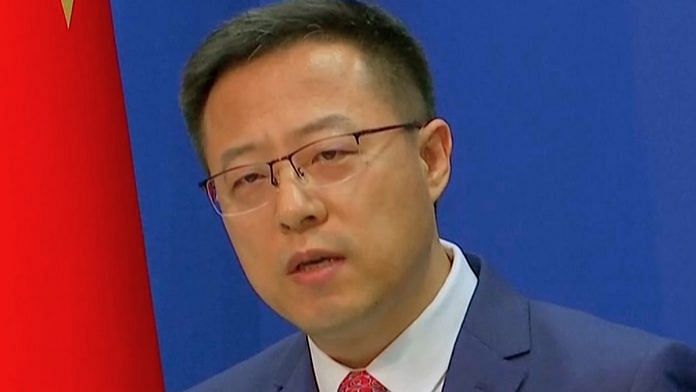New Delhi: Days after China reassigned its Foreign Ministry spokesperson Zhao Lijian out of the information department to a role in the border areas ministry, the move is not only being seen as a demotion by analysts but has also been met with heightened speculation on whether this reflects a significant enough shift in Beijing’s diplomatic strategy.
Zhao now holds the position of Deputy Director-General in the Department of Boundary and Ocean Affairs, which is responsible for driving policies on land and maritime boundaries as well as managing “land boundary delimitation and demarcation” and overseeing maps and place names, according to China’s Foreign Ministry website.
The latest decision by the Xi Jinping government comes after appointing Qin Gang to replace Wang Yi as Minister of Foreign Affairs and removing Qin from his prior position as Ambassador to the United States.
The South China Morning Post labelled the move as part of a “broader reshuffle of Beijing’s diplomatic leadership” which has meant that Assistant Minister of Foreign Affairs Hua Chunying is now the senior most foreign ministry spokesperson in the information department. Wang Wenbin, Mao Ning, Hu Jian and Jiang Xiaoyan will now serve as her deputies, the Post added.
Also Read: Nepal SC bans Army from awarding infra project to China firm after protest from Indian company
‘Wolf Warrior’ diplomat
Perhaps the biggest reason behind the speculation over shift in China’s diplomatic strategy is that Zhao Lijian had made a name for himself as a “wolf warrior” diplomat for China.
The term “wolf warrior” comes from the 2015-17 Chinese action war film franchise of the same name, directed by and starring Wu Jing. The films are centred on a Chinese Special Operations Forces unit and one of their most skilled snipers played by Wu, as they essentially function as a team of “lone wolves” thwarting a drug smuggling operation in the first film, and serving as protection for aid workers in South Africa in the second installment.
Frequent in his use of Twitter, Zhao criticised foreign governments, particularly those of the West, for seemingly hypocritical policies and alleged human rights abuses committed both domestically and overseas.
On numerous occasions, Zhao would not mince his words when making these criticisms, occasionally even relying on humour to make his point. For instance, on 16 August last year, Zhao went viral for tweeting a meme on global perceptions of American foreign policy and referencing 9/11 trutherism. “Everyone needs a clear understanding of himself. So does a nation,” he added.
On foreign policy, Zhao had also hit out at Australia on multiple occasions, alleging war crimes committed by the Pacific nation during the US-led war in Afghanistan. “Australia owes the world an explanation,” he said.
Australia’s then-prime minister Scott Morrison had demanded an official apology from China in 2020 after Zhao tweeted a “false image” when alleging that Australian forces had committed war crimes on Afghan children.
Similarly, during the height of the Covid pandemic, Zhao had hit out at then-US Secretary of State Mike Pompeo for using the term “Wuhan virus” as well as US Congressman Mike Gallagher for his criticisms of China’s “systematic coverup” of the outbreak of Covid and for perpetuating the Wuhan lab leak theory.
In both situations, Zhao responded with conspiracy theories alleging that the US was responsible for spreading both Covid and SARS from a military base called Fort Derick.
While it has given no clear explanation behind the decision to reassign Zhao, the reasoning behind speculation over China shifting its diplomatic strategy rests on the Xi government’s aforementioned appointment of Qin Gang.
Also Read: ‘None of their business,’ says US to China’s objections to Yudh Abhyas
Shift in diplomatic strategy?
According to Bloomberg News, which described the appointment as a “sign of softer touch”, Qin was known for traversing the fine lines between “defending China’s interests and projecting a moderate take on Beijing’s positions.”
These moderate positions and friendlier approach to the US include attending and participating as a VIP and a fan in Major League Baseball and National Basketball Association games, as well as claiming that China would have “tried to stop” Russia’s Ukraine invasion if it were aware of Putin’s plans, Bloomberg added.
However, Sichuan University professor Pang Zhongying and National University of Singapore associate professor Alfred Wu offered different takes on the issue than the Bloomberg report’s prediction.
While Pang told the South China Morning Post that Qin would only oversee “some adjustment” in China’s diplomacy style, Alfred claimed that Zhao’s reassignment does not necessarily indicate a “lessening of wolf warrior diplomacy”.
(Edited by Anumeha Saxena)
Also Read: ‘Double agent drone’ — this is how Ukraine is using a Soviet-era weapon to attack Russia



